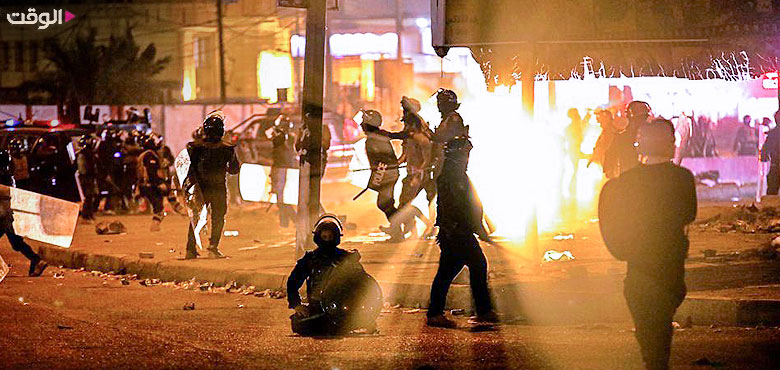Alwaght- As new round of protests begins in southern Iraq, local sources talk about a foreign plot in the country to restore riots and insecurity to the Iraqi cities.
A couple of days ago, Mohammad al-Baldawi, a member of the Sadeqoun parliamentary coalition, described the US consulates in southern Iraq as the factor behind the violence, killings, and other developments in Dhi Qar province.
Al-Baldawi said that his coalition had reliable documents proving the US intelligence role in the recent “sedition” and fueling the divisions in southern parts. The coalition handed the information to the related authorities, he said.
As these days return to the unrest is becoming a serious concern of the Iraqi officials, former Prime Minister Adel Abdel Mahdi in an interview disclosed the US role in the collapse of his government. Abdel Mahdi’s government fell last year as a result of continued protests in the capital and the southern provinces despite approving reforms demanded by the demonstrators amid violence.
In his remarks to Hiwar Al-Fikr news outlet, the former PM said that Washington opposed him remaining in the post because he refused to cut off economic ties with Iran and called for the exit of the US troops from the country.
“At the time, the US asked us to walk on a single foot. Walking on a single foot has its specific dangers since it makes it easy for one party to cut the other foot and thus cripple you. This happened to us but we could not accept hostile policy to Iran,” he told the outlet.
Now with the renewed street riots and the Iraqi officials’ admission of the US role in the unrest, the question is that what is Washington’s goal behind pressuring the government of Mustafa al-Kadhimi?
The US economic stick over Iraq head
Certainly, the push to restart the riots in the southern provinces specifically Basra, which is the main source of the Iraqi oil export, is driven by an intention to put strains on the Iraqi government. Trump’s strategy is based on the two strategic goals of cutting the Iranian influence in Iraq and keeping the US forces in the Arab country. This comes while since the assumption of power by Prime Minister Mustafa al-Kadhmi in May, his government leaned to maintaining the economic ties with Iran despite the US pressures and his different approach to Iran compared to his predecessor. He instead tried to walk on a tight rope between the US and Iran. During his trip to Washington in mid-August, al-Kadhimi tried to boost the economic partnership with the US to moderate the White House pressure campaign. Iran is a big trade partner to Iraq and the US economic sanctions policy against Tehran caused big troubles for Baghdad leaders in the past two years.
While the Trump administration presented a three-year timetable for its military withdrawal under the pressure of the Iraqi public and political faction especially the resistant anti-occupation groups, the al-Kadhimi government, which is aware of big home opposition, considers accepting the stay fatally bad for his holding the post. So, now Washington is sure that it is impossible to keep its forces in Iraq via gaining support from the al-Kadhimi cabinet.
These conditions make the US, which finds itself in the front of a blocked path in terms of realization of its goals, agitate crisis in the country in hope of a transformation. After the failure of ISIS revival, the White House strategists are heading to creating an economic crisis as the most important gate to the tumult in the country. The recent weeks’ unrest in the southern and central regions of the country has prepared the ground for increased ISIS attacks in the southern regions. Suffering from impacts of years of war, occupation, heavy costs of anti-terror battle, the devastation of the infrastructures, coronavirus outbreak, and slump in the price of oil as the main source of income, Iraq is in dire straits economically.
But the US did not stop at fueling the riots in the southern provinces, which have the biggest grounds for protest due to high unemployment rates and economic problems. Moreover, it ties the hands of the officials seeking a settlement to the crisis. For example, while last year Iraq was close to signing a pact with China to deliver 3 million oil barrels per month in return for the Chinese investment in reconstruction projects, the agreement failed to conclude due to the American pressures, according to Ali Sadoun, a member of the parliamentary commission for economy and investment.
Will the US policy shift under Biden?
Over the past four years, Trump's policy posed a big challenge to Iraqi governments. From imposing massive sanctions on Iran and Syria, which left their impacts on the Iraqi economy and foreign policy as the two countries are key trade and political allies to Baghdad, to escalating the tensions against the resistant groups in Iraq specifically after the assassination of top Iranian General Qassem Soleimani and Iraq’s Abu Mahdi al-Muhandis put heavy pressures on the Iraqi government to expel the American troops.
Now the question is that will the US quit the crisis-driven pressure on Baghdad under Joe Biden?
Biden’s West Asia policy did not receive adequate clarification during the election campaigns as internal American crises overshadowed the campaigns. Still, regardless of what the Biden team’s idea would be, it can be said that Washington is not left with a rather favorable choice in Iraq. Trump’s confrontational dealing with the demand for military exit from Iraq not only did not cause Iraqi retreat from the parliament’s expulsion push but also severely compromised the security of the American troops and workers in Iraq. Additionally, the repeatedly-tried-and-failed policy of anti-Iranian sanctions and anti-Iraqi pressure to join the anti-Tehran campaign only caused aversion to the White House’s overbearing interventions among the Iraqi public and politicians.



























